A snowboarder is expected to make a full recovery after spending two cold and snowy nights lost on Whistler Mountain over the weekend.
Whistler Search and Rescue (WSAR) volunteers managed to locate the man, a 32-year-old former soldier visiting from Singapore, on Sunday morning, Dec. 19, after an approximately 40-hour search, said WSAR president Brad Sills. The man was “well into the hypothermic spectrum” with a core temperature of less than 29 degrees Celsius when he was found, said Sills. He was airlifted to the Whistler Health Care Centre. “His prognosis was some frostbite; he had a head injury but he survived,” Sills said.
The man was reported missing at around 4 p.m. on Friday, Dec. 18, after he failed to meet his ski buddy at the Roundhouse at 1 p.m.
“His last known position was the top of [Whistler’s] peak—we figured he was on the south side, and we sent a ski-touring party into Cheakamus. That was an epic slog,” said Sills, referencing the massive snowstorm that rolled into the Coast Mountains Friday evening.
Whistler experienced a low of -11.6 degrees C on Dec. 17 and -7.2 degrees C the following day. The temperature did not go above freezing at any point while the man was lost. Complicating search conditions was the 66.6 millimetres of precipitation that fell Saturday.
After the initial search party was unable to locate or make contact with the man, WSAR called their colleagues at North Shore Rescue to see if their night-vision-equipped helicopter was able to assist. After two separate attempts, conditions prevented the aircraft from being able to fly safely to Whistler.
WSAR then turned to the Comox-based 442 Transport and Rescue Squadron and their CH-149 Cormorant aircraft for help. The long-range helicopter can operate in severe conditions, Sills noted. The crews searched the area spanning the Cake Hole along the south side of Whistler Mountain to the shore of Cheakamus Lake, but were unable to locate the snowboarder on either night.
“So now he’s spent two nights out, while the temperature’s have been very unusually cold for Whistler, so we were quite concerned,” said Sills.
When the weather cleared, “At daybreak yesterday we had two [Blackcomb] helicopters that started searching. We went back to the area that 442 had noted the night before,” he continued. “We saw the tip of a snowboard in a creek bed, but couldn't find anything, continued searching, came back to that site. Thought it was a rock sticking out of the creek bed but it turned out to be our subject, sitting very stoically.”
Crews managed to extricate the man via long-line rescue back to the Cheakamus Lake parking lot, where a doctor examined the man.
“We had a big turnout [of volunteers], everybody wanted to make one last valiant attempt at it—the weather had cleared, and it was a nice day. I have to say, most people were preparing themselves for the worst, especially when we saw him from the helicopter… and he wasn’t moving.” Volunteers from Squamish, Pemberton and North Shore SAR organizations had members on the way to help Sunday morning, Sills explained. He estimates 30 to 40 rescuers assisted with search efforts over the three days.
Sills said the man fell back on his military training, stayed put and managed to dig a small snow pit to keep himself out of the wind, and lined it with sapling branches he’d pulled off nearby trees.
The man told rescuers he became lost after following two other skiers off the backside of Whistler's peak, Sills explained. “I think it's one of these cases of tourists who come here and they’re just overwhelmed by the scope of the place… they just kind of ski from lift to lift and they don’t really understand the network, and I think they come to believe that at the bottom of every trail there’s a ski lift. The top of the Cake Hole looks pretty inviting.”
One lesson to takeaway is to always carry extra clothing and a flashlight with you on the mountain, said Sills.
For more information about how to stay safe in the mountains this winter, head to adventuresmart.ca for trip planning tips. The organization is also hosting online Snow Safety Education: Backcountry sessions on Wednesday, Dec. 23 and Thursday, Jan. 13, 2022, for anyone heading into the backcountry this winter, or anyone who wants to learn more about what to do if they find themselves lost and in need of help. Register here.




